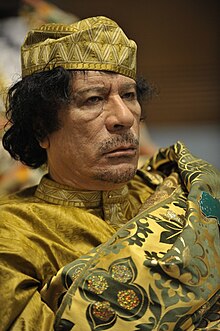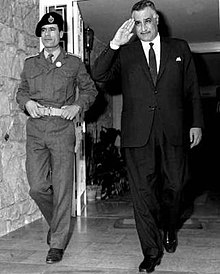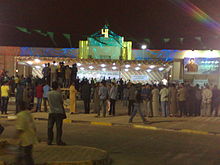History of Libya under Muammar Gaddafi
Muammar Gaddafi became the de facto leader of Libya on 1 September 1969 after leading a group of young Libyan Army officers against King Idris I in a bloodless coup d'état.When Idris was in Turkey for medical treatment, the Revolutionary Command Council (RCC) headed by Gaddafi abolished the monarchy and the constitution and established the Libyan Arab Republic, with the motto "Unity, Freedom, Socialism".[13] The fall of the last remaining sites in Sirte under pro-Gaddafi control on 20 October 2011, followed by the subsequent killing of Gaddafi, marked the end of the Libyan Arab Jamahiriya.The discovery of significant oil reserves in 1959 and the subsequent income from petroleum sales enabled the Kingdom of Libya to transition from one of the world's poorest nations to a wealthy state.Although oil drastically improved the Libyan government's finances, resentment began to build over the increased concentration of the nation's wealth in the hands of King Idris.In its initial proclamation on 1 September,[15] the RCC declared the country to be a free and sovereign state called the Libyan Arab Republic, which would proceed "in the path of freedom, unity, and social justice, guaranteeing the right of equality to its citizens, and opening before them the doors of honorable work."The RCC advised diplomatic representatives in Libya that the revolutionary changes had not been directed from outside the country, that existing treaties and agreements would remain in effect, and that foreign lives and property would be protected.Idris, in an exchange of messages with the RCC through Egypt's President Nasser, dissociated himself from reported attempts to secure British intervention and disclaimed any intention of coming back to Libya.[16] The government was challenged a second time in July 1970 when Abdullah Abid Sanusi and Ahmed al-Senussi, distant cousins of former King Idris, and members of the Sayf an Nasr clan of Fezzan were accused of plotting to seize power for themselves.It acted as a "vehicle of national expression", purporting to "raise the political consciousness of Libyans" and to "aid the RCC in formulating public policy through debate in open forums".On 19 October 1973, Libya was the first Arab nation to issue an oil embargo against the United States after US President Richard Nixon announced the US would provide Israel with a $2.2 billion military aid program during the Yom Kippur War.Production continued to fall, bottoming out at an eleven-year low in 1975 at a time when the government was preparing to invest large amounts of petroleum revenues in other sectors of the economy.In an attempt to instill revolutionary fervor into his compatriots and to involve large numbers of them in political affairs, Gaddafi urged them to challenge traditional authority and to take over and run government organs themselves.In the scope of their administrative and regulatory tasks and the method of their members' selection, the people's committees purportedly embodied the concept of direct democracy that Gaddafi propounded in the first volume of The Green Book, which appeared in 1976.The changes in Libyan leadership since 1976 culminated in March 1979, when the General People's Congress declared that the "vesting of power in the masses" and the "separation of the state from the revolution" were complete.In turn, all adults had the right and duty to participate in the deliberation of their local Basic People's Congress (BPC), whose decisions were passed up to the GPC for consideration and implementation as national policy.The ambiguity may have helped serve Gaddafi's aim to remain the prime mover behind Libyan governance, while minimizing his visibility at a time when internal opposition to political repression was rising.A property law was passed that forbade ownership of more than one private dwelling, and Libyan workers took control of a large number of companies, turning them into state-run enterprises.This Islamic Legion was mostly composed of immigrants from poorer Sahelian countries,[44] but also, according to a source, thousands of Pakistanis who had been recruited in 1981 with the false promise of civilian jobs once in Libya.[68] Political scientist Riadh Sidaoui suggested in October 2011 that Gaddafi "has created a great void for his exercise of power: there is no institution, no army, no electoral tradition in the country", and as a result, the period of transition would be difficult in Libya.According to Douglas Farah, "The amputation of the arms and legs of men, women, and children as part of a scorched-earth campaign was designed to take over the region's rich diamond fields and was backed by Gaddafi, who routinely reviewed their progress and supplied weapons".[56]: 183 On 11 June 1972, Gaddafi announced that any Arab wishing to volunteer for Palestinian militant groups "can register his name at any Libyan embassy will be given adequate training for combat".[56]: 182 On 7 October 1972, Gaddafi praised the Lod Airport massacre, executed by the communist Japanese Red Army, and demanded Palestinian terrorist groups to carry out similar attacks.The Socialist Labour League's Workers News was one such publication: "in among the routine denunciations of uranium mining and calls for greater trade union militancy would be a couple of pages extolling Gaddafi's fatuous and incoherent green book and the Libyan revolution.The full lifting of the sanctions, contingent on Libya's compliance with the remaining UNSCRs, including acceptance of responsibility for the actions of its officials and payment of appropriate compensation, was passed 12 September 2003, explicitly linked to the release of up to $2.7 billion in Libyan funds to the families of the 1988 attack's 270 victims.In 2002, Gaddafi paid a ransom reportedly worth tens of millions of dollars to Abu Sayyaf, a Filipino Islamist militancy, to release a number of kidnapped tourists.[31] In December 2003, Libya announced that it had agreed to reveal and end its programs to develop weapons of mass destruction and to renounce terrorism, and Gaddafi made significant strides in normalizing relations with western nations.[116] In 1994, the General People's Congress approved the introduction of "purification laws" to be put into effect, punishing theft by the amputation of limbs, and fornication and adultery by flogging.[31] Reportedly 10 to 20 percent of Libyans worked in surveillance for Gaddafi's Revolutionary Committees,[citation needed] a proportion of informants on par with Saddam Hussein's Iraq or Kim Jong Il's North Korea.[124] It is the Libyan people's responsibility to liquidate such scums who are distorting Libya's image abroad.Gaddafi employed his network of diplomats and recruits to assassinate dozens of his critics around the world.





Libya
Countries that recognised the
National Transitional Council
(NTC) as the sole legitimate representative of Libya
Countries that had permanent informal relations with the NTC, or which voted in favor of recognition at the UN, but had not granted official recognition
Countries which opposed recognition of the NTC at the UN, but had not made a formal statement
Countries that said they would not recognise the NTC
Libyan Arab RepublicThird International TheoryThe Green BookArab Liberation FlagFederation of Arab RepublicsAfrican UnionAddis AbabaMuammar GaddafiPersonalArab nationalismNasserismEscape to HellKillingInternational reactionsReception and legacyLoyalismAwards and honoursFree OfficersArab Socialist UnionRevolutionary Command CouncilGeneral People's CommitteePoliticsBrotherly Leader and Guide of the RevolutionSecretary General of the General People's CongressChairman of the Revolutionary Command CouncilPrime Minister of LibyaChairperson of the African UnionArmed Forces1969 Libyan revolutionYom Kippur WarLebanese Civil WarEgyptian–Libyan WarChadian–Libyan WarAction in the Gulf of Sidra in 19861986 United States bombing of LibyaToyota WarFirst Libyan Civil WarNATO invasion of LibyaSocialist People's Libyan Arab Jamahiriya1970 expulsion of Italians from Libya1973 oil crisisCultural RevolutionWeapons of mass destructionWest Berlin discotheque bombingLockerbie bombingUTA Flight 7721971 Libyan Federation of Arab Republics referendumde factoLibyan ArmyKing Idris Ibloodless coup d'étatTurkeymonarchyconstitutionUnity, Freedom, SocialismJamahiriyaEastern BlocFidel Castro'sNelson Mandela'sAfrican National CongressYasser Arafat'sPalestine Liberation OrganizationProvisional Irish Republican ArmyPolisario FrontChad in the 1970s and 1980sLibya's foreign relationsWestern statesanti-imperialistanti-Zionistpan-Arabpan-Africanistcivil rightsSoviet UnionWestern Europe9/11 attacksnuclear disarmamenta civil warArab Springanti-Gaddafi forcesNational Transitional Councilinterim authoritymultinational coalitionInternational Criminal Courtfall of Tripolikilling of GaddafiArabicCoat of armsWaḥda, Ḥurriyya, IshtirākiyyaWalla Zaman Ya SelahyTripoliGovernmentUnitaryNasseristone-partyArab socialistrepublicmilitary dictatorshipRevolutionaryCommandCouncilMahmud Suleiman MaghribiAbdessalam JalloudCold WarArab Cold WarCoup d'étatJamahiriya establishedPopulationLibyan dinarCalling codeISO 3166 codeKingdom of LibyaHistory of LibyaPrehistoryAncient historyRoman eraIslamic ruleSpanish TripoliHospitaller TripoliOttoman TripolitaniaItalian colonizationItalian TripolitaniaCyrenaicaItalian LibyaAllied occupationFirst Civil WarGeneral National CongressHouse of RepresentativesSecond Civil War